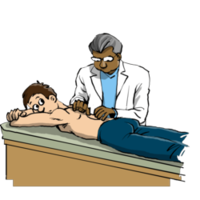Non-pharmacological and Lifestyle Approaches to Attention-Deficit/Hyperactivity Disorder: 8. Massage and Manipulation

There is a small but persuasive literature on the value of massage and manipulation in people with attention-deficit hyperactivity disorder (ADHD).
Massage
The first study involved 28 adolescents with ADHD who were given either massage therapy or relaxation therapy for 10 consecutive school days. The massage therapy group, but not the relaxation therapy group, rated themselves as happier and observers rated them as fidgeting less following the sessions. After the 2-week period, their teachers reported more time on task and assigned them lower hyperactivity scores based on classroom behavior.
The second study was a randomized controlled trial involving 30 students aged 7-18 years. The results indicated that therapeutic massage given for 20 minutes twice a week produced significant improvements in both classroom behavior and mood.
There are a large number of studies that have shown that massage therapy can be helpful in managing anxiety in many different situations (1. 2.)
And it may also have some beneficial effects on the immune system.
Manipulation
There has been a great deal of interest in the notion that chiropractic manipulation may have an impact on the symptoms of ADHD.
A small study of seven children diagnosed with ADHD showed some improvements in ratings of hyperactivity.
There are some interesting case reports:
In the first a young girl who had been diagnosed with ADHD whose symptoms had failed to respond to an astonishing array of medications, but who improved once a cervical kyphosis was treated.
The second concerned a nine-year-old with Tourette’s and ADHD who showed a remarkable improvement after a course of chiropractic treatment.
The third concerned an 8-year-old with multiple learning and behavioral disorders associated with ADHD that improved after a course of chiropractic treatment. This case was rather different form the others in that the symptoms began after a fall, and it seems likely that the problems were at least in part due to pain and discomfort, and the child’s improvement may have been related to an improvement in both. The case highlights the importance of remembering that problems with mood, sleep and attention may be secondary to other medical or psychological maladies.
A recent review article on chiropractic care in people with learning disabilities and dyslexia does touch on ADHD and rightly concludes that the evidence so far is interesting but far from conclusive.
There is clearly a great deal of scope for further research into massage and manipulative therapies and ADHD.
I shall keep you posted if any more studies come out.
I am indebted to Dennis da Ponte from Life University in Atlanta for helping track down some of the papers that I referred to in this article.






